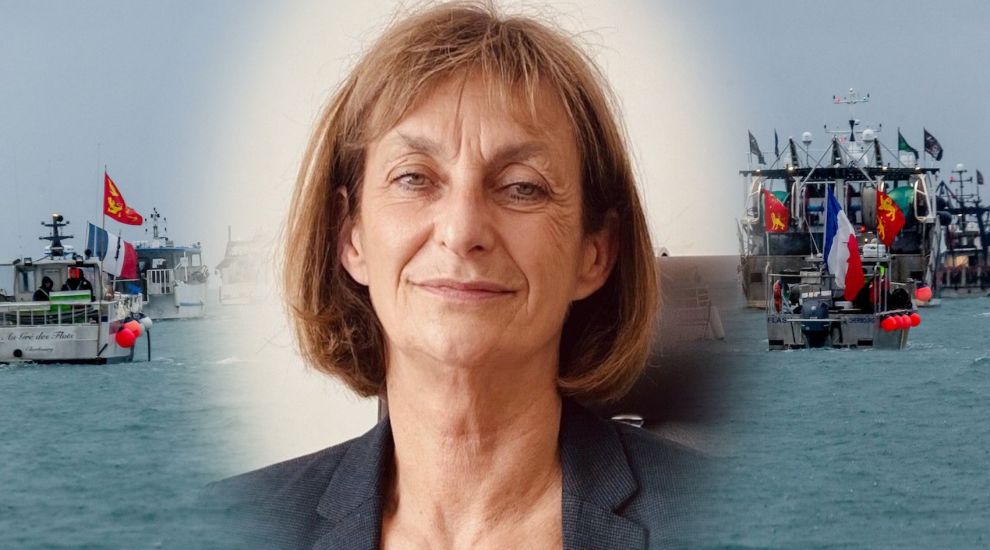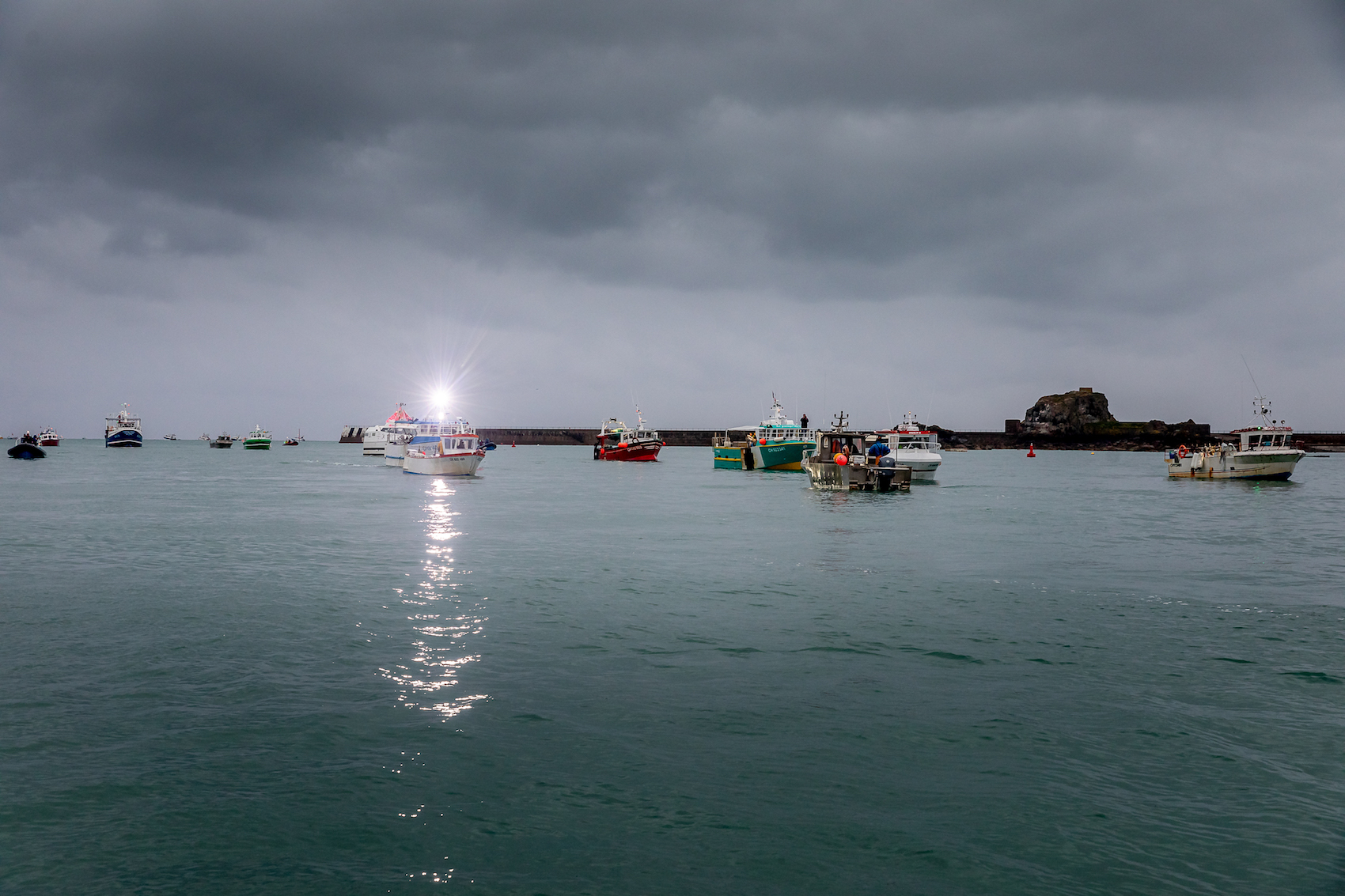


A Manche Senator is urging French fishermen and Jersey authorities to speak to each other directly to find a solution to the fishing crisis – but the move has pitted her against France’s Minister of the Sea and regional fishing committees.
Béatrice Gosselin, the former mayor of Gouville-sur-Mer, recently met a group of around 30 fishermen, who she said are very worried about Jersey's new licensing regime for controlling its waters after Brexit, and how it will impact their livelihood.
She expressed support for the direct lines of communication Jersey’s Government had proposed setting up with French fishermen, which was one of the resolutions agreed between the two sides during crisis talks in St. Helier Harbour earlier this month, following protests by both Norman and Breton fishermen.
Previously, all communication between the two had to go via the UK and EU - something Jersey's Government suggested may have led to some information necessary for issuing licences getting lost along the way.
Ms Gosselin explained she had herself already floated the idea of direct communications between both sides earlier this year, but had been shot down by the heads of the local fishing committee.
Since the protests, France's Minister of the Sea, Annick Girardin, has also blasted the idea. In a letter to the European Commission calling for Jersey's new regime to be cancelled, she said all direct communication should cease immediately.

Pictured: French boats protesting in Jersey's waters at the beginning of this month.
“I believe that the best solution would be to have fishermen on both sides along with the fishing committees,” Ms Gosselin told Express. “The situation and the geography are so closely interlinked that issues on one side will automatically create issues for the other. I really think that communication is needed between the two fishing industries, which are interlinked and depend on each other.
“There are so many interactions, whether in terms of fishing or landing catch, that we really need the negotiations to be carried out by professionals who know the work and all the different interactions, under the supervision of the European Commission and the Brexit authorities.
“I believe this would be the solution, but I am getting told it needs to be done a different way because this is not what is set in the [UK-EU Brexit agreement].
“It seems to me that it would be fairer, wiser and a lot more practical to work with professionals along with the relevant authorities. Given that... the situation has not changed much, is the current formula the best? I am starting to have doubts about it, and I think the fishermen are starting to become very worried.
“Obviously this is not about doing things behind the European Commission’s back, as it would be overseeing the results. The ideal would be to have, within the same working group, representatives from the Commission, from the fishing industry in Jersey and France - people who want to move on and who know their respective causes are interlinked.”
Une trentaine de pêcheurs sont réunis à Gouville-sur-Mer pour une réunion au sujet de #Jersey la sénatrice Béatrice Gosselin répond à leurs questions et première révélation : les fisheries de #Jersey n’ont pas reçu les dossiers pour attribuer les licences pic.twitter.com/AtyHxfIfEB
— Marie Carof-Gadel (@mcarofgad) May 14, 2021
Pictured: Ms Gosselin meeting fishermen in Gouville-sur-Mer, where she used to be the Mayor.
Ms Gosselin said she only recently learned that the applications for fishing licences for boats of under 12 metres have not yet been sent by the fishing committees. The delays for this, she has been told, are due to constantly evolving requests from Jersey.
For larger vessels, she called for the licences to be reworked and negotiated on a case-by-case basis due to the fact fishermen only learned last December that they would need to provide evidence of their fishing activity over the years 2017, 2018 and 2019. Ms Gosselin said this is causing difficulties not only because fishermen do not have the relevant paperwork but also because fishing varies from one year to the other due to resources or climate.
“It would be a shame if they were to be penalised based on a decision that was not announced before and on which you can’t act once the moment is gone,” she said.
Video: Ms Gosselin speaking in the French's Assembly earlier this month.
“When you're going on precedent, without having set the rules before, it’s a bit complicated.”
Ms Gosselin called for both sides to be flexible, arguing that both will benefit from a closer collaboration. She said that while she welcomed the important work done by France's Maritime Minister, Annick Girard, she regretted her suggestion that retaliatory measures be taken on Jersey’s electricity supply.
“I can see Jersey chimneys from home, we all are ‘anglo-normands’,” she said.
“Our lives are linked to each other, it’s been the case for centuries. We have to take those very particular conditions into account, the life between Jersey and the Manche coast has always existed and we need to put that at the forefront and work hard to find solutions that are fair for everyone.
“Dropping a bomb like this catches people’s attention, but I do regret that such arguments have been used. I would have preferred to have more positive discussions. You can’t negotiate the same way as if we had kilometres of coastline separating us and as if we didn’t have those historic connections that are part of our daily lives.”

Pictured: France's Maritime Minister, Annick Girard, who threatened to pull the plug on Jersey's electricity supply.
Ms Gosselin issued a reminder that it is the lives of fishermen on both sides of the dispute that will be affected by the decision and called for a speedy resolution.
But her calls have not found favour among the key regional fishing heads.
Following Ms Gosselin's meeting with around 30 fishermen, the Normandy Regional Fishing Committee responded furiously. According to Ouest-France, they said her intervention "could end up being dangerous for the continuation of the negotiations.”
Raising the fact that the Republican politicians comments came during an "electoral period", they added: “…The Regional Committee represents all professional fishermen from Granville to Tréport. As a result, it is politically neutral. The technical aspects of fishing are formidably complex and require a considerable investment to understand all the ins and outs... Nomandy’s Regional Fishing Committee cannot allow irresponsible stances or remarks likely to break France and Europe’s united front against undue British demands.
"Encouraging fishermen to provide their data directly, by playing on their legitimate fear for the future fuelled by Jersey’s unilateral decisions without warning, will allow Jersey, London's frontline, to gradually force Norman fishing out of its waters with random and targeted measures.”
Speaking around 24 hours earlier, Ms Gosselin had told Express: “My intention is not to add fuel to the fire. All I am hoping for is to bring a proposition of goodwill on our very local and coastal issue, not to go against anyone. It feels like the situation is getting bogged down and I don’t want to see people around me constantly worried like they have been for the past six months.
“This is their life, their family life, their professional life, their future, and you can see they are not coping well. There are lives behind this dispute, people who work hard and who are only asking to do it well so we have to bear this in mind.
“Everyone will be a winner if we work together and communicate because we are so close. This proximity makes it impossible to live one without the other and we need to work together and find solutions together.”
1. French regional fishing committees (Normandy and Brittany)
Collect details from French fishing vessels and liaise with them about any particular issues.
2. French Government (Paris)
Receive information weekly from the regional fishing committees, and verify the information sent. Have weekly discussions with Brussels relating to the Brexit deal.
3. The European Commission (Brussels)
Verify and validate documents sent by France. Hold Brexit negotiations with the UK.
4. UK (London)
Forward the documents sent from Brussels. Hold Brexit negotiations with the European Commission.
5. Jersey
Verify the documents received from London. Issue licences based on their contents.
Comments
Comments on this story express the views of the commentator only, not Bailiwick Publishing. We are unable to guarantee the accuracy of any of those comments.